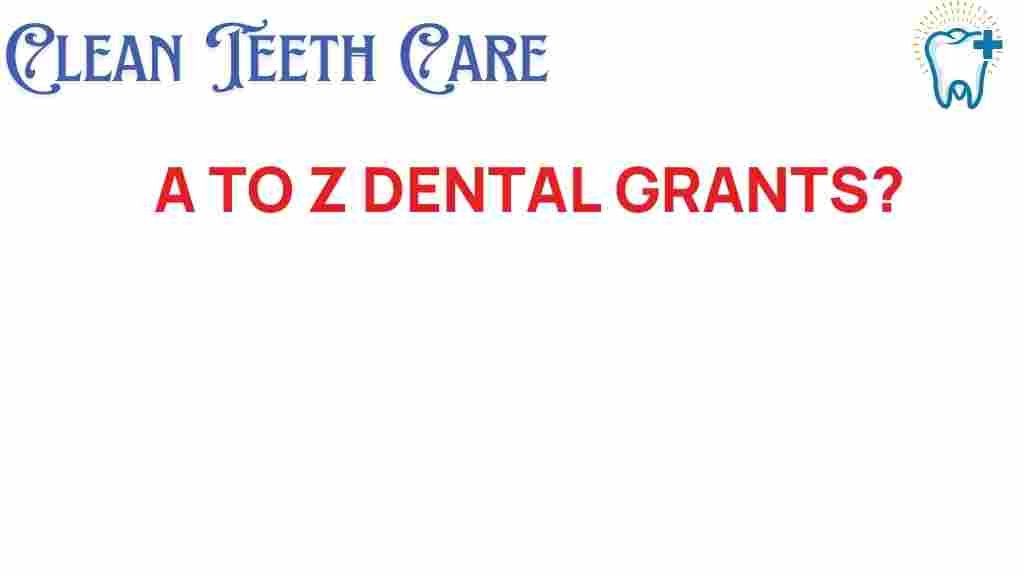Unlocking the Secrets of A to Z Dental Grants: Are You Eligible?
Dental care is vital for maintaining overall health, yet many individuals struggle to afford the necessary treatments. Fortunately, dental grants provide a beacon of hope for patients seeking financial assistance with their oral health needs. In this comprehensive guide, we will explore the various types of dental grants, how you can determine your eligibility, and the steps to secure funding for your care. This article will serve as an invaluable resource for patients looking to navigate the complex world of healthcare financing.
Understanding Dental Grants
Dental grants are financial aid programs designed to help individuals cover the cost of dental care. These grants can be offered by government agencies, non-profit organizations, and private foundations. They aim to improve oral health outcomes by making dental services more accessible to those in need.
Types of Dental Grants
There are several types of dental grants available, each catering to specific needs and circumstances:
- Government Grants: Many state and federal government programs provide funding for low-income families and individuals. These grants may cover preventive care, restorative procedures, and more.
- Non-Profit Organizations: Various organizations focus on providing dental care to underserved populations. They often offer grants or assistance programs targeting specific demographics, such as children, seniors, or individuals with disabilities.
- Scholarships for Dental Students: Some grants are available for dental students who commit to serving in high-need areas after graduation. These programs help increase access to care in underserved communities.
Eligibility Criteria for Dental Grants
Determining your eligibility for dental grants is a crucial first step in securing funding. While criteria may vary by program, common factors include:
- Income Level: Many dental grants are aimed at low-income individuals and families. You may need to provide proof of income, such as tax returns or pay stubs.
- Age: Some programs are specifically designed for children, seniors, or other age groups, so be sure to check the requirements.
- Residency: Eligibility may depend on your state or local area, as some grants are only available in specific regions.
- Dental Needs: Some grants focus on particular dental issues, such as orthodontics, emergency care, or preventive services.
How to Apply for Dental Grants
Once you have determined your eligibility for dental grants, the next step is to apply. Here’s a step-by-step process to guide you:
Step 1: Research Available Grants
Start by researching various funding programs. Websites of government agencies, non-profit organizations, and dental schools often provide lists of available grants. You can also check online databases that compile funding opportunities.
Step 2: Gather Required Documentation
Prepare the necessary documentation to support your application. Common documents include:
- Proof of income
- Identification (such as a driver’s license or Social Security card)
- Dental records (if applicable)
- Proof of residency
Step 3: Complete the Application
Fill out the application form thoroughly, ensuring you provide accurate and detailed information. Pay attention to deadlines and application submission guidelines.
Step 4: Follow Up
After submitting your application, follow up with the organization to confirm receipt and inquire about the timeline for decision-making. This step can demonstrate your interest and help you stay informed about your application status.
Common Dental Grant Programs
Below are some notable dental grant programs that you may want to consider:
- Medicaid: A state and federal program providing health coverage for low-income individuals, which often includes dental care.
- CHIP (Children’s Health Insurance Program): Offers dental coverage for children in families with incomes too high to qualify for Medicaid but too low to afford private coverage.
- Dental Lifeline Network: Provides access to dental care for vulnerable populations through its Donated Dental Services program.
Troubleshooting Tips for Dental Grant Applications
Applying for dental grants can be daunting, and you may encounter obstacles along the way. Here are some troubleshooting tips to help you navigate the process:
Tip 1: Be Thorough in Your Application
Ensure that you provide all required information and documentation. Incomplete applications can lead to delays or denials.
Tip 2: Keep Copies of Everything
Maintain copies of your application and supporting documents. This can help if there are questions or if you need to reapply later.
Tip 3: Seek Help if Needed
If you find the application process confusing, consider reaching out to local dental clinics, community health centers, or non-profit organizations for assistance. They may offer guidance on filling out applications or finding additional resources.
Conclusion
Dental grants can be a vital resource for individuals seeking financial assistance to improve their oral health. By understanding the different types of grants available, determining your eligibility, and following the application process, you can unlock the potential for funding your dental care needs. Remember, access to quality dental care is essential for overall health and well-being, and these programs are designed to ensure that everyone can receive the care they deserve.
For further information about available programs and assistance, check out the National Institute of Dental and Craniofacial Research. Additionally, to learn more about healthcare funding options, visit Grants.gov.
This article is in the category Treatments and created by CleanTeethCare Team
